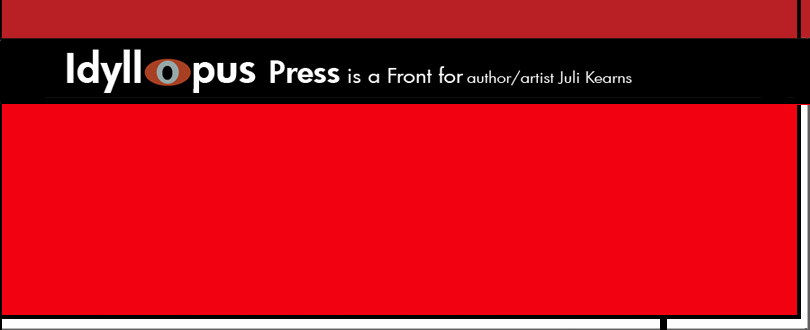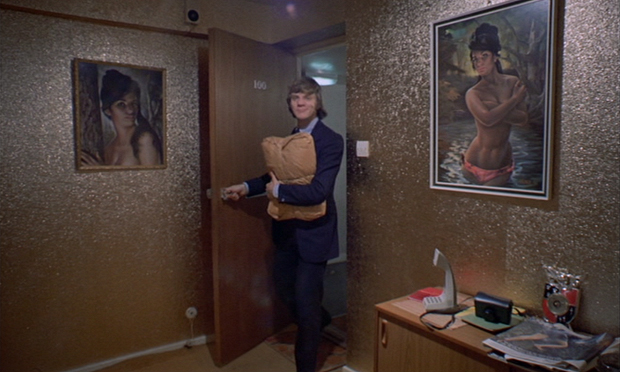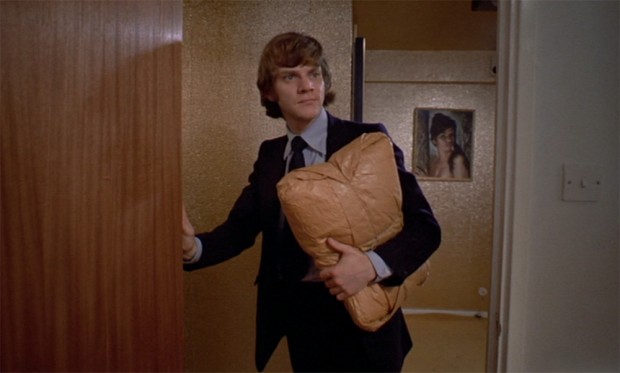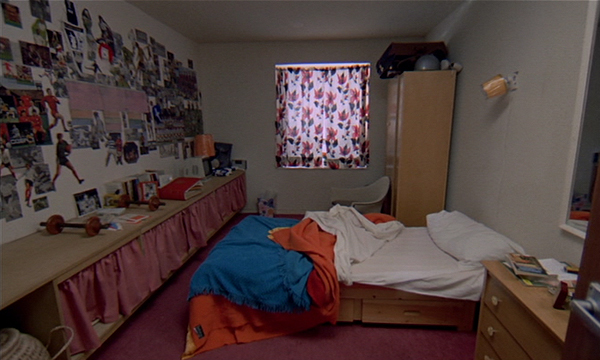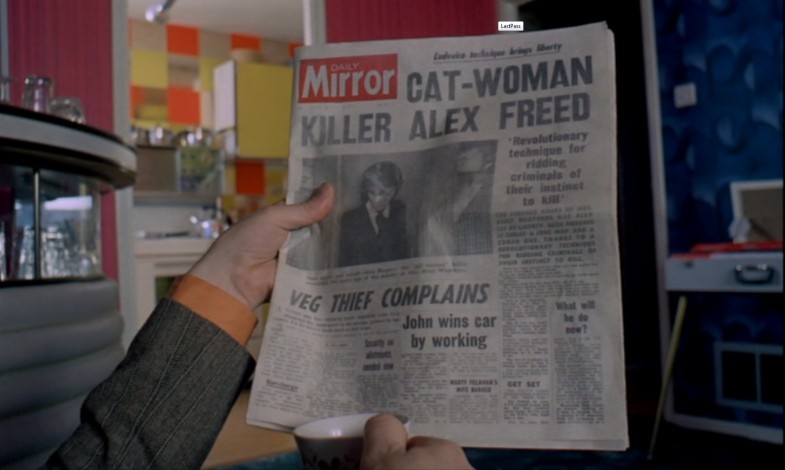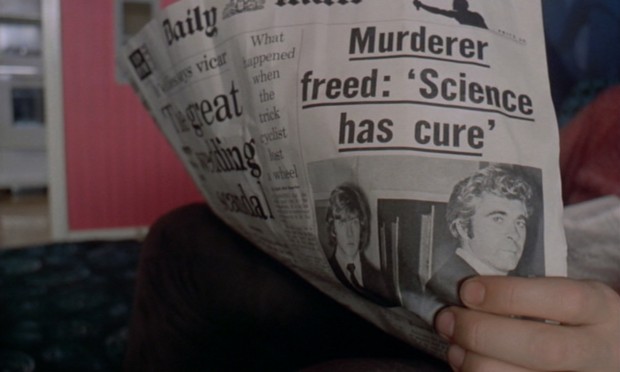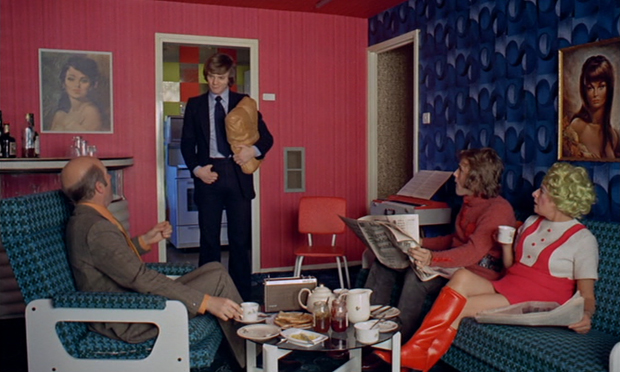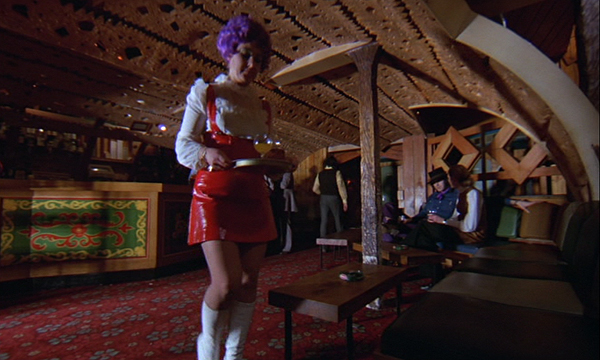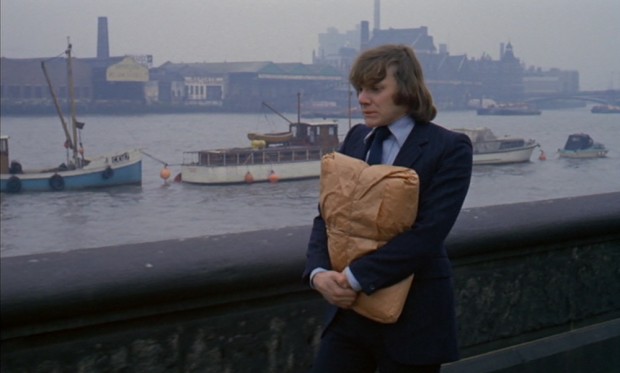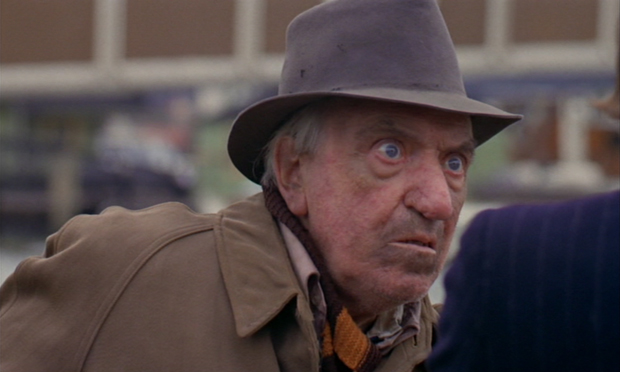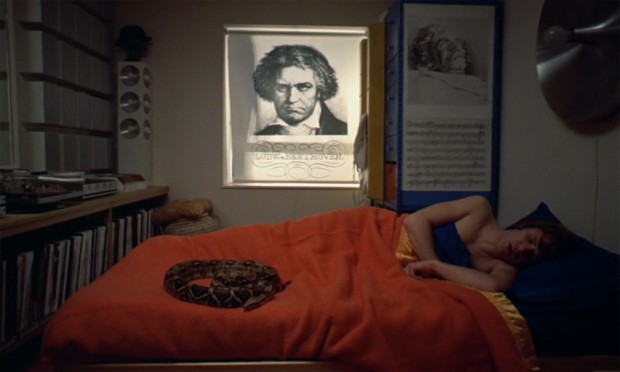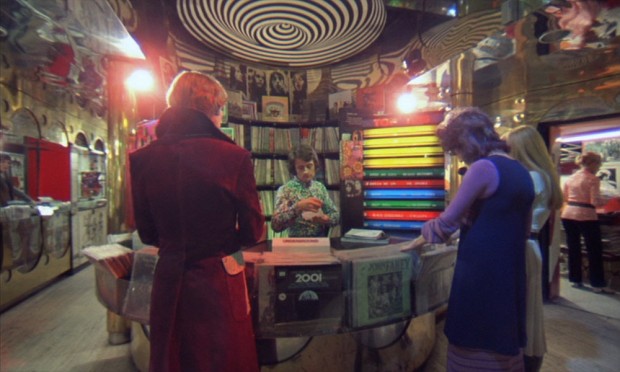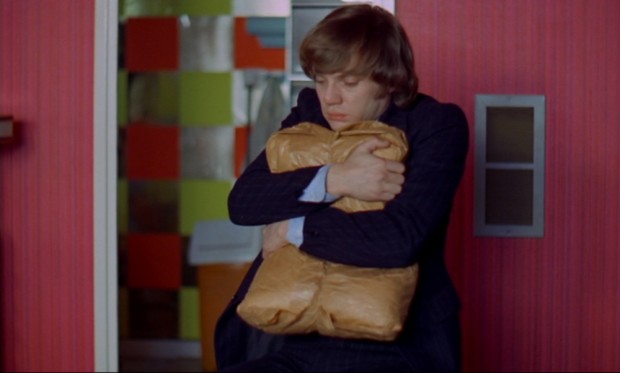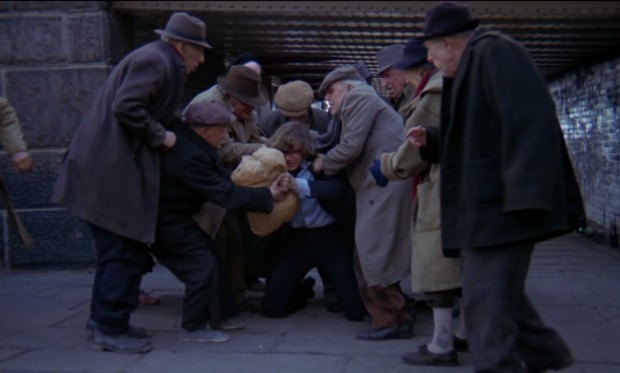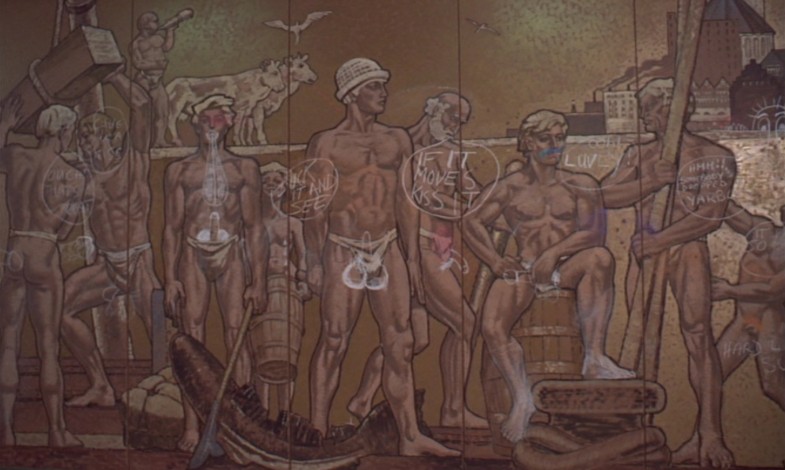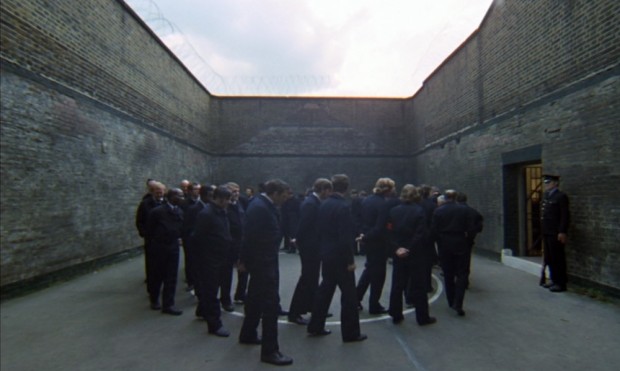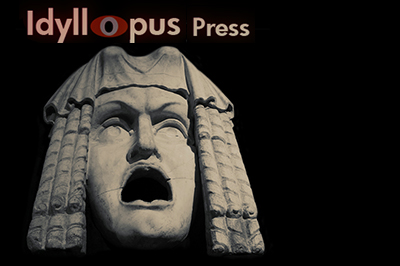STANLEY KUBRICK'S A CLOCKWORK ORANGE

Go to TOC for this film ( (which has also a statement on purpose and manner of analysis and a disclaimer as to caveat emptor and my knowing anything authoritatively, which I do not, but I do try to not know earnestly, with some discretion, and considerable thought).
PART SIX
TOC and Supplemental Posts | Part 1 | Part 2 | Part 3 | Part 4 | Part 5 | Part 6 | Part 7 | Part 8 | Films Home
LINKS TO SECTIONS OF THE ANALYSIS ON THIS PAGE:
Alex Revisits 18A-Linear North, Shots 454 through 496
The art work as an oracle and mirror of Alex's life. What will he do now. The newspapers. The lighthouse keeper.
Alex Revisits the Irish Bum, Shots 497 through 528
The mural as representing the embankment. Alex as 666. 100 Cheyne Walk and Antonioni's Blow-up.
Notes on the Mural
Decoding the mural at 18A-Linear North. The parcel and the note which Alex delivers to the clerk at the music store. Another look at The William Tell Overture and its relationship to the mural and embankment.
.
Leviathan and Alex as 666
ALEX REVISITS 18A-LINEAR NORTH
THE ART WORK AS AN ORACLE AND MIRROR OF ALEX's LIFE - WHAT WILL HE DO NOW - THE NEWSPAPERS - THE LIGHTHOUSE KEEPER
454 LS Entry hall of the 18A-Linear North apartment (1:28:05)
Cut to Alex opening the door to the flat he previously lived in with his parents.
We see now he lives in apartment 100.
He enters its entry hall that is papered with textured gold-toned wallpaper. We are to take it that all his his worldly goods are wrapped in a brown paper parcel under his arm, but I will return to this parcel and explore it in detail later. Somewhat lurid, kitsch "art" prints of scantily clothed women gaze from the walls at the camera. Alex confidently flicks his keys in the air and pockets them, passing the credenza on which rests a phone, perhaps an ad from a magazine or newspaper showing the legs of a person who appears to be climbing something. There's also a red and blue shield of some sort. These effects are different from the time we observed the credenza behind his mother when she stood at his locked door calling him for breakfast, and they should be different, it has been two years since he's been home.
Though these popular kitsch paintings, by Joseph Henry Lynch, aren't high art, there is something enigmatic about them, giving the feeling of some other world peering in on the proceedings. At least the way Kubrick has framed them in this environment gives this feeling. Somewhat kitsch pastels of indigenous children were used in The Shining to much the same effect, the feeling of the walls gazing on the proceedings.
Passing his bedroom and looking in the door, Alex falters. His posture duplicates that of the enigmatic woman in the painting on the wall behind him. The companion portrait shows a woman with arms crossed over her breasts, and during the scene Alex will eventually duplicate this posture, clasping the parcel h holds to his chest with crossed arms.
455 LS Alex's bedroom. (1:28:21)
In place of the speakers for his music system and the mirror which had been opposite his bed are clipped images from sports magazines papering the wall. His stereo and all his music is gone. Instead there are barbells on the counter opposite his bed, framed personal photos, and a large red bound book. Even the tall blue dresser beside the wood finished one is gone. The death portrait of Beethoven is gone, as is the Beethoven blind, replaced with red flowered curtains now hung over the window instead of his image. The art work of the woman that had been beside Alex's bed is gone, as is the perch for his snake, the art replaced by a mirror. His bedspread with its sculptural quilting is gone. Oddly enough, the two orange blankets which he'd had on his bed remain.
The mauve carpet which had not previously stood out is now complemented and made obvious with the mauve flounces that have been added to the cabinet opposite Alex's bed. Thus, the bedroom presents a peculiar combination of feminine and masculine elements, so that the barbell and the sports pictures seem less masculine than homo-erotic, but this is also because clippings of this type observed in Alex's cell at the prison, are of nude and semi-nude women, sexualizing these images in comparison.
456 MCU The hand of Alex's father holding a newspaper. (1:28:26)
Alex's parents are now observed in the living room reading articles to do with Alex's rehabilitation.
His father holds the Mirror, its headline reading "Cat-Woman Killer Alex Freed". The first portion of the article is "Revolutionary technique for ridding criminals of their instinct to kill. The ... killer of Mrs. Alice Weathers has been set at liberty. Alex Burgess is today a free man and a cured one thanks to a revolutionary technique for ridding criminals of their instinct to kill." Other headlines are "Ludovico technique brings liberty", "Revolutionary technique for ridding criminals of their instinct to kill", "Veg Thief Complains", "John wins car by working".
How does one "win" a car by working? Doesn't work enable one to purchase a car? The implication is that the worker is not owed anything and instead rewards come as a matter of chance, though one can only enter the chance pool by participation which is here qualified as working.
A headline reads "Marty Feldman's Wife Banned". Does Marty Feldman make it in here because of his googly eyes?
A curious headline in the lower right corner of the page reads, "What will he do now?"
In Eyes Wide Shut a newspaper was notably used to comment on the action, rather than only supplying information for a character. Bill learned of Amanda's death via a newspaper, but on its cover was "Lucky to be Alive", apparently referring to Bill's situation. So it's reasonable to assume paper content would provide side comment as well.
457 MCU The Daily Telegraph newspaper viewed from behind the right shoulder of Alex's mother. (1:28:28)
His mother holds the Daily Telegraph, its headline being, "Crime Cure Will Strengthen Law and Order Policy" by a Loretta Alcott (Marty Feldman's wife was a Loretta Sullivan). Alex is seen in a photo holding up his arm against the flash of a camera.
The article is written by a Loretta Alcott, and Alcott was the name of the doctor who had received Alex into the Ludovico facility. No Alcott is mentioned in Burgess' book. John Alcott was Kubrick's cinematographer. If one realizes that we had a doctor Alcott receiving Alex, then the report in the paper, also by an Alcott, gives the impression that the government and the news media share the same bed.
If one was still wondering what year in which all this is intended to occur, the paper shows that the Daily Telegraph reports for August of 1970 1,393,287 copies sold daily.
458 CU The Daily Mail paper. (1:28:34)
We see the cover of "The Daily Mail", its headline being, "Murderer freed: Science has cure". Other headlines are, "The Great Wedding Scandal", and "What happened when the trick cyclist lost a wheel."
459 LS The Living Room of the apartment, Alex's parents and a lodger enjoying breakfast. (1:28:38)
Kubrick now shows us the fuller context for the reading of the papers, Alex's parents and an unknown man seated in the living room enjoying breakfast. His mother is in a blond wig, red boots, and a red and white dress that is designed to convey the appearance of a jumper much like one we earlier observed on a waitress in the Duke of York scene. She sits on the couch close beside a young gentleman. Alex's father is seated opposite. Tea, jam, toast, and other breakfast stuffs rest on a glass coffee table between the couch and its matching chair.
The music playing since Alex's entry into the apartment is the cheery, absurd, "I want to marry a lighthouse keeper."
The version in the film is different from the soundtrack, the film version following:
I want to marry a lighthouse keeper and keep him company, I want to marry a light house keeper and live by the side of the sea.
I'll polish his lamp by the light of the day, so the ships at night can find their way.
I want to marry a lighthouse keeper, won't that be okay? We'll have parties on the coral reef and clambakes on the shore. We'll invite the neighbors in, seagulls by the score.
I dream of living in a lighthouse baby, every single day. Dream of living in a lighthouse, the white one by the bay. So if you want to make my dreams come true, you'll be a lighthouse keeper anew.
We could live in a lighthouse, the white one by the bay. I'll polish his lamp by the light of the day so ships at night can find their way. I want to marry a lighthouse...
"We'll have parties on the coral reef and clambakes on the shore" is sung as we viewed the newspaper over the shoulder of Alex's mother. While it was sung, she moved her tea cup slightly so a partially obscured headline of her paper was revealed for the camera, it reading "Yachtsman", perhaps apropos the song. It was after this we had the cut to the paper being read by the unknown individual, as "We'll invite the neighbors in" was sung.
Alex will enter the room as "I dream of living in a lighthouse" is sung, and his father jumps in surprise, spilling coffee.
The soundtrack on the album differs from the film. It has, in place of parties on the coral reef, clambakes and seagulls by the score, the lines, "we'll take walks along the moonlit bay, maybe find a treasure, too. I'd love living in a lighthouse, how about you." It also differs with "You'll be a lighthouse keeper anew", instead having "You'll be a lighthouse keeper do."
The wedding idea in the song is reinforced by the "Wedding scandal" headline in the paper the unknown man holds.
One could infer that the wedding scandal comments on the psychological situation of the parents and the lodger, the younger man treating Alex's mother in an intimate manner.
In The Shining a light house is shown as Dick Hallorann watches the news just prior his shining Jack's confrontation with the woman in the bathroom of Room 237, which takes a horrifying turn when she becomes the animated, decaying corpse of an elderly woman.
Alex's mother's attire recalls that of the waitron in the Duke of York pub.
Alex's parents look at him in startled amazement as he enters.
DAD (putting down his cup): Son!
ALEX: Hi, hi, hi there, my pee and em.
MUM (placing down her cup): Alex!
ALEX: Mom. How are you love, nice to see ya.
Alex, stepping over the lodger, greets his mother with an awkward hug and kiss.
460 MS Alex greeting his father. (1:28:56) Alex turns to face his father, who has stood.
ALEX: Dad!
DAD (nervous): Hi. What a surprise. Good to see you.
Alex momentarily frightens his father asking him if he's keeping fit and taking a fake swing at his face.
ALEX (patting his father on the back in a partial hug): How are you then? How are ya?
DAD: Oh, fine, fine. Keeping out of trouble, ya know.
ALEX: Well, I'm back!
Alex's father reacts in dismay to his bravado announcement.
DAD: Aye, yes.
461 LS The living room, Alex amongst his family. (1:29:12)
Alex's father turns off the radio on the table as he seats himself, the music ending.
DAD: Good to see you, dad.
MUM: Why didn't you let us know what was happening, son?
ALEX: Sorry, em...
462 MCU Alex. (1:29:19)
ALEX: ...I wanted it to be something like a big surprise...
463 MS Alex's father. (1:29:20)
ALEX: ...for you and pee.
DAD: It's a surprise, all right, and a bit bewildering, too.
464 MS The lodger seated beside the mum, from the right of the dad's POV. (1:29:25)
MUM: We've only just read about it in morning's papers.
DAD: Aye, you should have let us know, lad.
465 MS Alex's father. (1:29:30)
DAD: Not that we're not very pleased to see ya again. And all cured, too, eh?
ALEX: That's right, dad...
466 MCU Alex. (1:29:38)
ALEX: ...they did a great job on me. I'm completely reformed!
Alex takes a big sniff of the room and turns to look in the kitchen.
ALEX: Well! Still the same old place then, eh?
467 MS Alex's father. (1:29:47)
DAD: Oh, aye, aye, aye.
468 MS Alex looking in the kitchen. (1:29:50)
Alex turns, faces his dad, approaches him and leans over him in an aggressive manner.
ALEX: Hey, dad. There's a strange fella sittin' on the sofa, munchy...
469 MS The lodger and Alex's mother. (1:30:03) The lodger eats toast.
ALEX: ...wunching lomticks of toast.
470 MS Alex bent over his father. (1:30:06)
DAD: That's Joe. He...he lives here now. The lodger. That's what he is.
We hear Joe munching on his toast.
DAD: He rents your room.
Alex, smiling, withdraws and faces Joe, smiling.
471 MS Joe and Alex's mum from behind Alex. (1:30:29)
ALEX: How do you do, Joe? Find the room comfortable, do ya? No complaints?
JOE: I've heard about you. I know what you've done.
Shot 460 | Shot 461 |
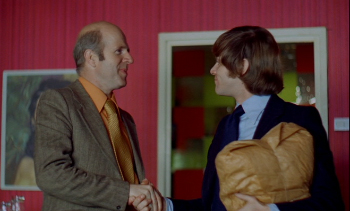 | 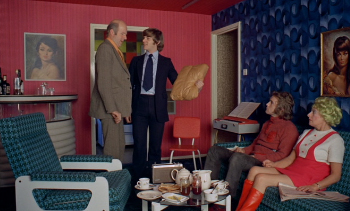 |
Shot 462 | Shot 463 |
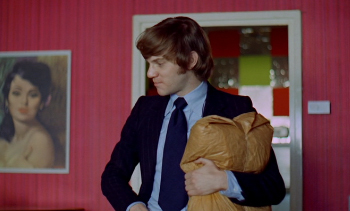 |  |
Shot 464 | Shot 465 |
 | 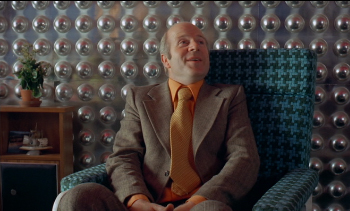 |
Shot 466 | Shot 467 |
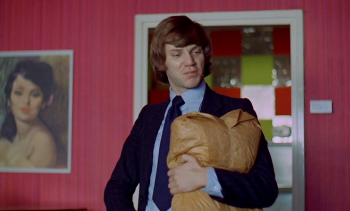 |  |
Shot 468 | Shot 469 |
 | 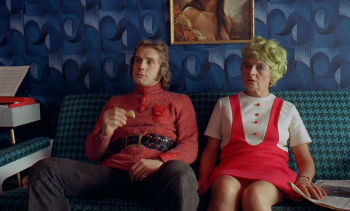 |
Shot 470 | Shot 471 |
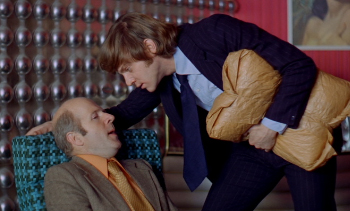 | 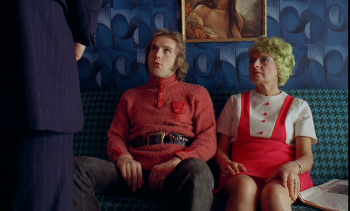 |
472 MS from the side as Joe rises to face Alex.
JOE: Breaking the hearts of your poor, grieving parents. So you're back, eh? You're back to make life a misery for your lovely parents once more, is that it? Well, over my dead corpse you will, because you see they've let me be more like a son to them than like a lodger.
Alex, whose expression has been one of gathering rage, draws back his arm to punch Joe but instead belches as Joe falls back.
473 MS Joe falling onto the sofa beside Alex's mother, from behind Alex. (1:31:08)
MUM (reaching her arms out to protect Joe in his fall against her): Joe! Joe! Don't go fighting here, boys!
474 MCU Alex as he falls back, belching, his fist still clenched. (1:31:12) He bows, clutching the parcel.
475 MS Joe settled back still against Alex's mother. (1:31:18)
Joe, with his barbells, taller and larger than Alex, confronting him, then falling back against Alex's mother for protection as Alex began to take a swing at him, strikes an odd figure. He wears what would then have been perhaps considered as posh threads, a red turtleneck sweater and brown pants, yet even in the 60s the broad gladiator type belt would have been an ostentatious gesture.
Though the scene earlier presented them in a romantic parody pairing, Joe becomes the mother's boy.
JOE: Well, do put your hand over your mouth, please, it's bloody revolting.
476 MS Alex falling back against the bar. (1:31:22) He collapses on it, knocking over glasses.
477 LS The living room, all watching Alex. (1:31:26)
DAD: Are you all right, lad?
MUM: Shhh, dad. (She points at the paper.) It's the treatment.
JOE: Well, it's disgusting, I mean it's enough to put you off your food.
MUM: Oh, leave him be, Joe. It's the treatment.
A kitchen chair is situated near the door. In the first breakfast scene in the movie, Alex had refused to leave his room for breakfast, saying he had to sleep, and we'd observed the empty chair to the rear of the breakfast table, between his parents, a cheery toy sunflower on the table assuming Alex's place. This scene revisits that breakfast, though here in the living room. Alex's chair still waiting for him, he collapses into it, his parcel clutched to his chest.
In what appears to be a caring gesture, Joe puts his arm around Alex's mother, but instead it is in reaction to Alex's exposed vulnerability and Alex's mother's sympathetic response. He is protecting his position.
DAD: Do you think we ought to do something?
MUM: Well, would you like me to make you a nice cup of tea, son?
Gasping, disarmed, Alex shakes his head, no.
Shot 472 | Shot 473 |
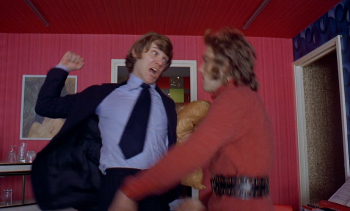 |  |
Shot 474 | Shot 475 |
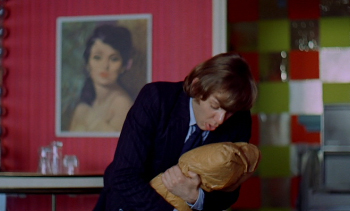 | 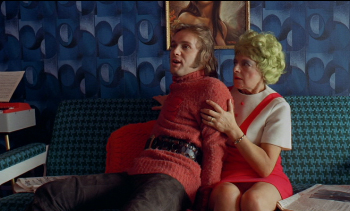 |
Shot 476 | Shot 477 |
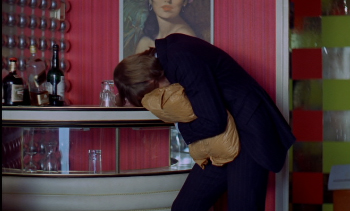 | 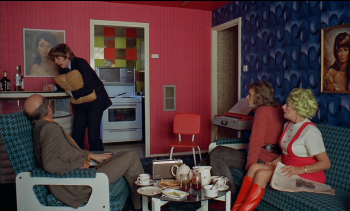 |
478 MS Alex in his chair, clutching his parcel to his chest. (1:31:50)
Music begins. The William Tell Overture.
ALEX: What have you done with all me own personal things?
479 MS Alex's father. (1:32:03)
DAD: Well, uh, that was all took away, son, by the police, new regulations, say, about compensation for the victims.
480 MCU Alex. (1:32:19)
ALEX: What about Bazel? Where's my snake?
481 MS Alex's father. (1:32:27)
DAD: Oh, well, he, he met with like an accident. He passed away.
482 LS The living room. (1:32:47)
ALEX: What's going to happen to me, then? I mean, that's my room he's in.
483 MS Another point of view of Joe sitting beside Alex's mother. (1:33:00)
ALEX: There's no denying that.
Joe looks to Alex's father wondering how he will respond.
ALEX: This is my home, also. What suggestions have you, my pee and em, to make?
Joe takes his arm from around Alex's mother and looks to Alex's father in his own challenging way.
484 MS Alex's father. (1:33:16)
DAD: Well, all this needs thinking about, son. We can't just very well kick Joe out, not just like that, can we. I mean, Joe's here doing a job. A contract it is, two years. And we made like an arrangement, didn't we, Joe? You see, son, Joe's paid...
485 MCU Alex (1:33:40)
DAD: ...next month's rent already, so, well, whatever we may do in the future we can't just say to Joe to get out, now can we?
JOE: No...
486 MS Joe beside Alex's mother. (1:33:54)
JOE: There's much more than that, though. I mean, I've got you two to think of. (He takes the hand of Alex's mother to rub it between his own.) You've been like a father and mother to me. Well, it wouldn't be fair now or right for me to go off and leave you two to the tender mercies of this young monster, who's been like no real son at all.
487 MCU Alex in tears. (1:34:09)
JOE: Well, look, he's weeping, now! But that's all his craft and artfulness.
488 MS Joe beside Alex's mother. (1:34:17)
JOE: Let him go and find a room somewhere else. Let him learn the errors of his way, and that a bad boy like he's been doesn't deserve such a good mum and dad as he's had.
Alex's mother begins to cry.
489 MCU Alex. (1:34:28)
ALEX: All right. I know how things are now. I've suffered...
490 MS Alex's father. (1:34:41)
ALEX: And I've suffered and I've suffered and everybody wants me to go on suffering.
Alex's mother's crying is heard.
491 MS Joe leaning forward, still seated on the couch. (1:34:48)
JOE: You've made others suffer. It's only right that you should suffer proper. You know I've been told...
492 MCU Alex. (1:34:58)
JOE: ...everything you've done, sitting here at night around the family table, and pretty shocking it was to listen to.
493 MS Joe and Alex's mother who has a hankie to her nose. (1:35:04)
JOE: It made me real sick, a lot of it did.
Alex's mother bursts into tears. Joe briefly glances back in seeming irritation, then looks at Alex again.
JOE: Now, look what you've gone and done to your mother. (He sits back and embraces Alex's mother.) It's all right, it's all right, it's all right.
494 MS Alex's father looking on in his bewildered and passive fashion. (1:35:15)
495 MCU Alex. (1:35:20) Alex wipes his eyes and slaps his leg resolutely. He stands.
Shot 478 | Shot 479 |
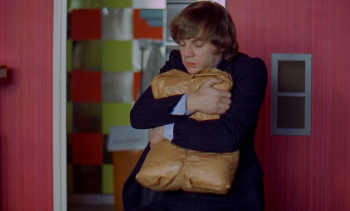 |  |
Shot 480 | Shot 481 |
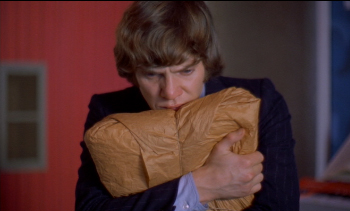 | 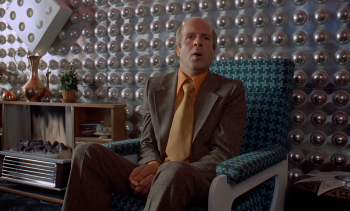 |
Shot 482 | Shot 483 |
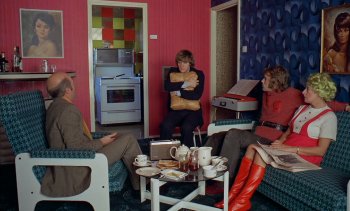 | 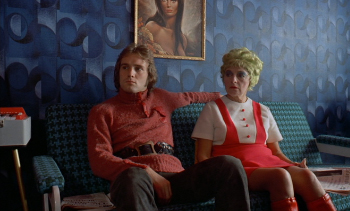 |
Shot 484 | Shot 485 |
 | 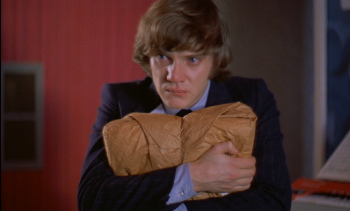 |
Shot 486 | Shot 487 |
 | 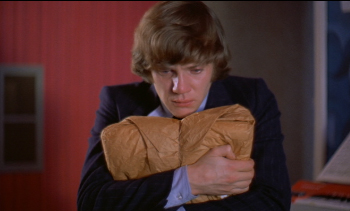 |
Shot 488 | Shot 489 |
 |  |
Shot 490 | Shot 491 |
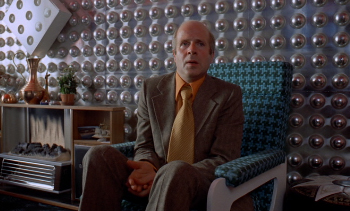 |  |
Shot 492 | Shot 493 |
 | 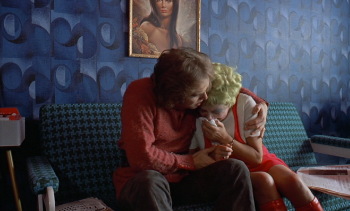 |
Shot 494 | Shot 495 |
 | 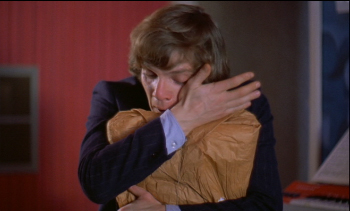 |
Shot 496 | |
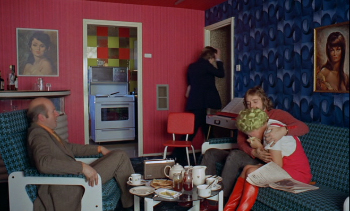 | |
496 LS The living room, Alex rising. (1:35:27)
ALEX: Right, I'm leaving now! You won't ever viddy me no more. I'll make me own way, thank you very much. Let it lie heavy on your consciences.
Alex turns and storms out of the room, his mother collapsing onto Joe in sobs.
DAD (rising): Now, don't take it like that, son, I...
Alex's mother sobbing loudly, Alex's father crouches down before her to comfort her, Joe enveloping him also in his embrace and stroking the bald pate of his head.
Alex's father wears an orange shirt in this scene, as do most who will now do their victimizing of Alex wear something orange.
ALEX REVISITS THE IRISH BUM
THE MURAL AS REPRESENTING THE EMBANKMENT - ALEX AS 666
497 MS Alex walking along an embankment, overlooking a river. (1:35:51)
The view of factories, their smokestacks, and skyscrapers, is reminiscent of the painting in the entry lobby of Alex's parents' building. Seagulls circling, crying, he stops and stares at the water under the bridge, the Dawn section from the William Tell Overture continuing.
498 MS Alex paused before the embankment looking into the water. (1:36:23)
499 LS The water under the bridge. (1:36:31)
The camera zooms in on a spot marked by curious ripples. Perhaps he is contemplating taking a leap from the bridge, committing suicide, when a man approaches, the Irish bum he and his droogs had assaulted at the beginning of the movie.
The bum wears a neck scarf with squares of orange.
The idea of drowning fits with Brodsky describing the effect of Serum 114 as being like stifling or drowning.
500 MS The Irish bum approaching Alex. (1:36:45)
BUM: Can you spare some cutter, me brother?
The bum had asked the same question of Alex and his droogs after his singing of Molly Malone, before he was accosted by the droogs and declared he didn't want to live any longer, that they should do him in as it was a stinking world with the young getting on to the old and there being no law and order.
Distracted, unhearing, Alex continues looking at the water.
BUM: Can you spare some cutter, me brother?
501 MCU Alex from behind the bum. (1:36:57)
BUM: Can you spare some cutter, me brother!?
Alex reaches in his pocket and searches for some change, probably the last that he has.
502 MS The bum and Alex. (1:37:09)
The bum, his hand held out, waits eagerly.
503 MCU Alex still searching his pocket. (1:37:14)
Shot 498 | Shot 499 |
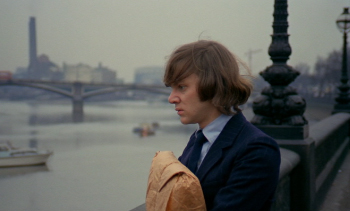 |  |
Shot 500 | Shot 501 |
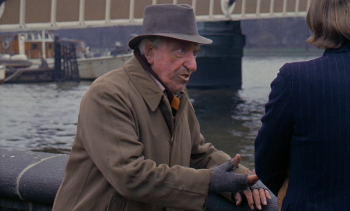 | 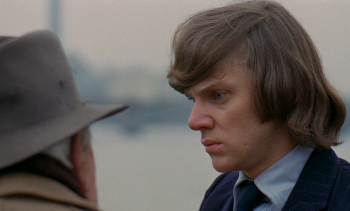 |
Shot 502 | Shot 503 |
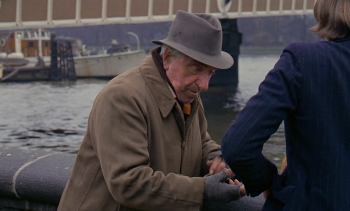 | 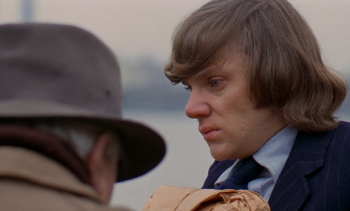 |
504 MCU The bum. (1:37:19)
The bum's eyes on Alex's hand searching his pocket, he hasn't closely examined his face. He takes the money from Alex and looks up at him now.
BUM: Thanks, brother.
The bum has now recognized who Alex is and draws closer, eyes widening.
505 MCU Alex from behind the bum. (1:37:31)
Alex realizes the bum is staring at him.
506 MS The bum standing beside Alex. (1:37:41)
BUM: Jamie Mac! (He strikes a boxing pose.) May the hokey fly.
I hear "mac" and "may the hokey" but am uncertain of the other words above. This dialogue isn't in the book.
507 MCU Alex from behind the bum. 1:37:46)
BUM: Holy mother of god and all the blessed saints in heaven...
Alex veers away, choking, beginning to be ill.
BUM: ...preserve us!
Shot 505 | Shot 506 |
 | 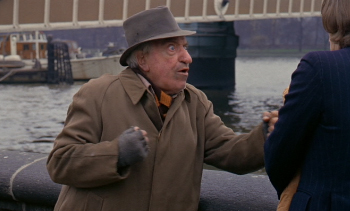 |
Shot 507 | Shot 508 |
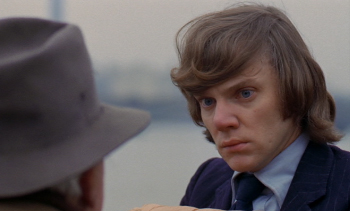 | 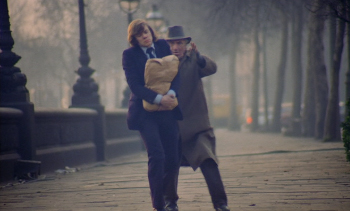 |
508 LS The bum following Alex down the walk. (1:37:50)
BUM: I never forget a face, me gob! I never forget any face!
ALEX: Leave me alone, brother, I've never seen you before!
Ahold of Alex, the bum propels him forward, in the direction in which Alex was already walking, under a bridge where we see a number of other elderly bums.
BUM: This is the poisonous young swine that near done me in! Him and his friends! They beat me and kicked me and (...)!
Alex attempts to run.
BUM: Stop him! Stop him! Stop him!
Tripped as he exits from under the bridge, Alex falls, the parcel falling from him. He grabs it and holds it under him as he hits the ground.
BUM: They laughed at me blood and me moans!
The bums crowd upon Alex, overwhelming him, attacking.
ALEX (VO): Then it was like a sea of dirty, smelly old men trying to get at your humble narrator...
A man in pale blue slippers wrestles the parcel from Alex and runs away with it.
ALEX: ...with their feeble rookers and horny old claws.
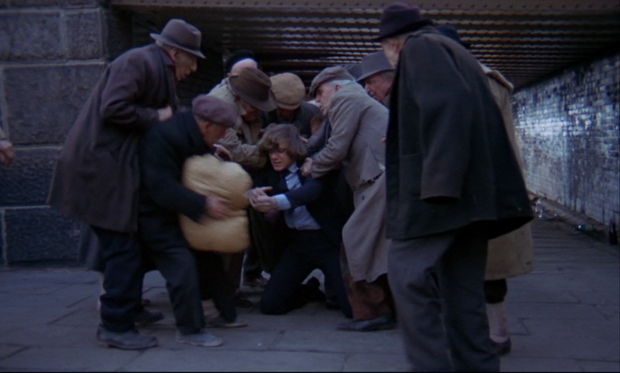
509 CU From below Alex as he is attacked. (1:38:21)
ALEX: It was old age having a go at youth...
510 CU Face of elderly man attacking. (1:38:23)
511 CU Face of elderly man attacking. (1:38:23)
512 CU Face of elderly man attacking. (1:38:24)
513 CU Face of elderly woman attacking. (1:38:27)
514 CU Face of elderly man attacking. (1:38:27)
515 CU Face of elderly man attacking. (1:38:27)
516 CU Face of elderly man attacking. (1:38:27)
517 CU Face of elderly man attacking. (1:38:27)
518 CU Face of elderly woman attacking. (1:38:28)
519 CU Face of elderly man attacking. (1:38:28)
520 CU Face of elderly man attacking. (1:38:29)
521 CU Face of elderly man attacking. (1:38:29)
522 CU Face of elderly man attacking. (1:38:30)
Shot 509 | Shot 510 |
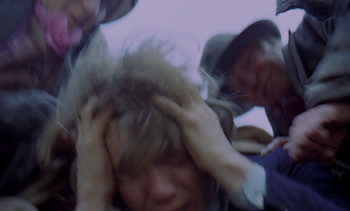 |  |
Shot 511 | Shot 512 |
 | 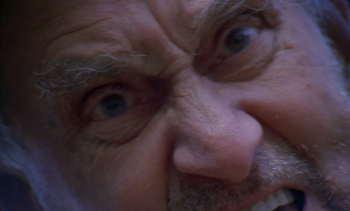 |
Shot 513 | Shot 514 |
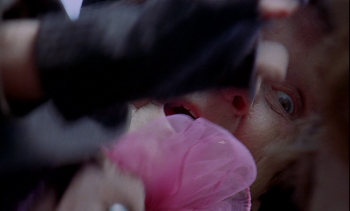 | 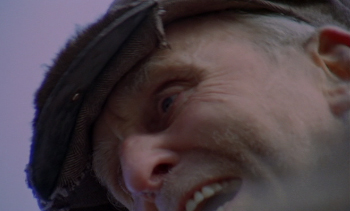 |
Shot 515 | Shot 516 |
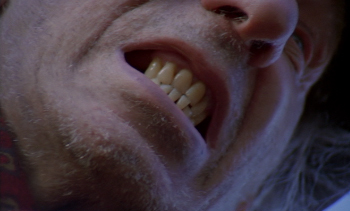 |  |
Shot 517 | Shot 518 |
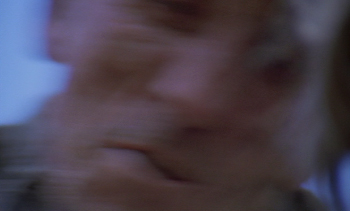 | 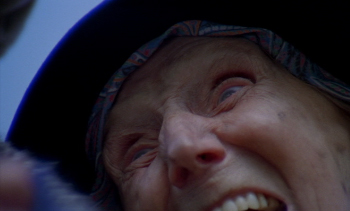 |
Shot 519 | Shot 520 |
 |  |
Shot 521 | Shot 522 |
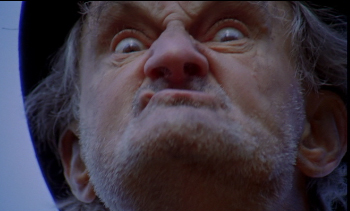 | 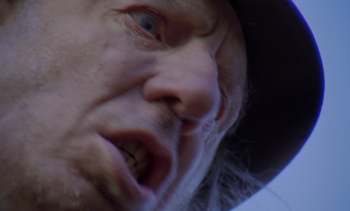 |
523 CU Alex in the midst of the mellee. (1:38:30)
ALEX (VO continuing throughout the above shots): ...and I daren't do a single solitary thing, oh my brothers, it being better to be hit at like that, than want to sick and feel that horrible pain.
524 LS The elderly surrounding Alex so that he can't be seen. (1:38:33)
The group is broken up by two police officers who enter from screen left.
DIM: All right! All right! Stop it now! Go on! Stop breaking the state's peace, you naughty boys! Back away! Away with ya!
The officers reach down to help the retching, belching Alex up. He sits back on his heels looking up at them.
DIM: What's your trouble, sir?
The camera does a quick zoom in on Alex's horrified expression.
ALEX: Oh, no!
525 MCU Dim in his officer's uniform, his number 665. (1:38:50) He recognizes Alex.
DIM: Well! Well, well, well! Well, well, well, well! If it isn't little Alex!
526 CU Alex. (1:39:06)
DIM: Long time no viddy, droog! How goes?
ALEX: It's impossible. I don't believe it.
527 MCU Georgie Boy in his uniform. (1:39:11)
Shot 523 | Shot 524 |
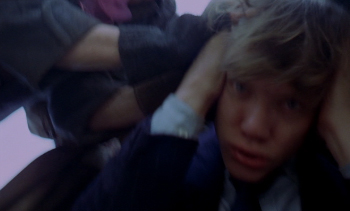 | 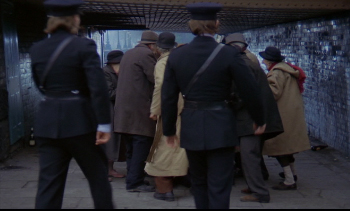 |
Shot 525 | Shot 526 |
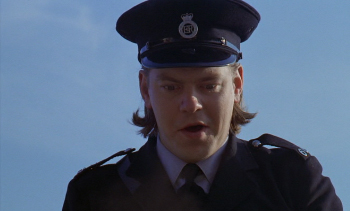 | 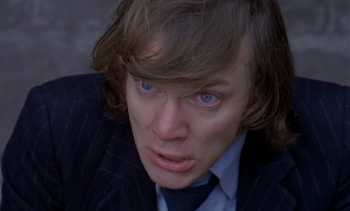 |
Shot 527 | Shot 528 |
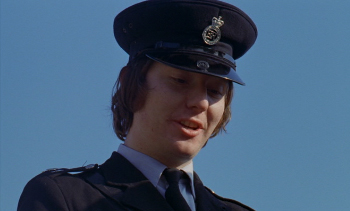 |  |
Georgie Boy's number is 667, and as Dim's number is 665, Alex between them would thus be a presumed 666, which is the biblical number of the so-called Antichrist, a person who serves as substitute for the "son of god". The musical number "Overture to the Sun/Son" plays into this, and if we look back at the painting in the entry lobby of Alex's parent's building we'll see on the far right a boy amongst the men, the graffiti of "Hard luv sun" over his legs. It all fits with Alex as the new and true Christian, absolutely unable to respond with violence, who has no choice but to turn the other cheek.
GEORGIE BOY: Evidence of the old glassies. Nothing up their sleeves. No magic, little Alex. A job for two who are now of job age.
Georgie and Dim laugh.
This line reminds of Lolita, the opening scene in which Peter Sellers, as Quilty, produces pingpong balls out from under a sheet he wears like a Roman toga, as if by by magic, and says, "Bet you didn't know I had that."
528 CU Alex. (1:39:22)
GEORGIE BOY: The police!
ANTONIONI'S BLOW-UP AND THE CLOSING PARTY AT 100 CHEYNE WALK
Kubrick has used in this film, for the threesome, an actress who was in a threesome with the photographer, Thomas, in Blow-up. After the photographer, Thomas, returns to the park and sees the body of the dead man, staring up with wide open eyes, he finds that all his photographic evidence has been stolen except for a single photo. At the film's end, he goes to a party at Cheyne Walk where he speaks with his agent about what has happened. The agent, stoned, is unable to focus on his story and Thomas gives up trying to explain it to him.The party was held at a house on Cheyne Walk, within view of the bridge where Alex has his encounter with the Irish bum who recognizes him and sets his friends on him. I understand the house Antonioni used was owned by Christopher Gibbs, No. 100. This area was the location of the farm of Thomas More, the Renaissance humanist who wrote the satire, Utopia.
NOTES ON THE MURAL
DECODING THE MURAL AT 18A-LINEAR NORTH - THE PARCEL AND THE NOTE WHICH ALEX DELIVERS TO THE CLERK AT THE MUSIC/DRUG STORE - ANOTHER LOOK AT THE WILLIAM TELL OVERTURE AND ITS RELATIONSHIP TO THE MURAL AND EMBANKMENT
In this section I'll be decoding the golden age mural at 18A-Linear North, describing its relationship to various parts of the film, based on the components of the mural.
First, I will begin with the mystery of the parcel which Alex carries home with him from prison, because looking more closely at it is what led to my finally figuring out the mural.
Alex entered the prison with virtually nothing--a watch, half a candy bar, keys, cigarettes, pens, a comb, an address book and a ten penny piece. The Chief Guard placed all his belongings (excepting the candy bar and cigarettes) in a slim manila envelope. This was all that Alex possessed, entering prison. Yet, when he arrives at home after his release he is carrying a parcel wrapped in manila brown paper.
This parcel actually appeared much earlier in the film.
We first see the parcel the night Alex is in his bedroom after his invasion of HOME. Just after he puts on Beethoven's 9th, the 2nd movement, the camera cuts to the image of Beethoven on the window blind and we have a brief glimpse of the parcel on the screen's lower left, a note attached to the top of it. You can barely see it, but it is there.
The following morning, Alex's mother knocking on his door, waking him, we get a fairly decent look at the parcel, the same as Alex is seen carrying when released from prison. It is atop a straw basket that is perhaps a laundry hamper. The basket's make reminds of that seen in movies which would be used by snake charmers for holding their cobras, so perhaps it is another receptacle for Bazel. Again, we observe the note paper atop it.
When we next see the parcel, it is after Alex's trip to the music store, the two women with him. Observe that the note paper is no longer atop the parcel. When they undress, they rest their clothes upon it, following Alex's lead, he having placed his Edwardian jacket atop it, the one with the snake-pattern trimmed lapels and cuffs.
Where is the note paper? What happened to it?
At the music store, Alex had taken out a piece of paper folded into quarters and handed it to the clerk, saying that he had ordered this two weeks beforehand and he was wondering if it was in yet. The clerk took the paper, unfolded it, read it, told Alex, "just a minute", then left, at which point Alex had picked up the two women.
My argument is that the note paper that was atop the parcel will be the one that Alex turned over at the music store.
Curious. What was on the note paper? What had Alex ordered?
This is the last we see the parcel until Alex is released from prison. When he arrives at home he has the same parcel with him.
When he looks in the door of his bedroom, seeing how it is changed, we note that his posture is almost exactly as the woman in the painting behind him.
What of the other painting of the woman, the one in which she is standing in water and has her arms crossed over her breasts? Do we see Alex elsewhere holding this pose?
Yes, he assumes approximately this pose as he clings to the parcel, realizing he has been abandoned, kicked out of his home, that he has no place to stay.
He is clinging to the parcel as he stands looking out over the Thames, the camera zooming in on a place in the river where there are ripples forming seemingly isolated from the general movement of the water. This again reminds of the woman standing in the water who had her arms over her breasts.
Finally, when he is attacked by the old men, the parcel is ripped from his hands by a seeming elderly midget who standing is about the same height Alex is on his knees--and one wonders if he, too, is named Alex, considering Alex is identified by Kubrick in the film as both Alex DeLarge (as he was in the book) and Alex Burgess. In other words, that it is a short man who is the one to slip up from behind and steal Alex's parcel is perhaps a play on Alex DeLarge.
We have a couple of other things that I believe are linked with the parcel but this is enough for the moment. So, "What is it with this package?" I wonder. It's important. It enters with Beethoven's 9th and then is torn from Alex's hands by the old man after his release. First, I think that Kubrick would likely have called this a parcel rather than a package. We're working with a parcel here. I decide to first look up in the book to see if the parcel (or package) is ever mentioned. It isn't. So I next look up what Alex is narrating as the parcel is torn from his hands, which is, "Then there was like a sea of dirty, smelly old men, trying to get at your humble narrator (the parcel is ripped from his hands) with their feeble rookers and horny old claws..."
In the book, Alex is in a library when revenge is being sought for his attack on a man who had been carrying a book on crystallography.
There was now like a sea of vonny runny dirty old men trying to get at me with their like feeble rookers and horny old claws, creeching and panting on to me...
Again, Alex is carrying no package or parcel in the book. A package or parcel is mentioned nowhere in the book.
So, still considering on the problem of the parcel, I then return to the book to see what it was Alex had gone to the music store to pick up, where he's told, "good news, good news, it has arrived." When the clerk returns, he's, "waving the great shiny white sleeve of the Ninth, which had on it, brothers, the frowning beetled like thunderbottled litso of Ludwig van himself."
So what Alex had gone to pick up was the 9th Symphony.
The 9th Symphony is not what is played, however, when Alex takes the women home with him in the movie. Kubrick has already introduced into the film Beethoven's 9th symphony the night previous, when Alex returns home from his HOME invasion. Instead, what plays when the women return with Alex to his bedroom in the movie is the William Tell Overture, the cavalry charge "March of the Swiss soldiers" finale.
When do we next hear the William Tell Overture? When Alex has returned home and is clutching the parcel to his chest, having been told that Joe has supplanted him as a son, and that his personal things have all been taken away as compensation for the victims and Bazel has died. The part of the William Tell Overture that is playing is the "Dawn" section. And it's absolutely beautiful and poignant and wonderful, Alex sitting in his parent's home, foresaken by them, clutching the parcel to his breast, tears flowing in earnest down his cheeks. Kubrick has us feel for this killer and rapist. Is the purpose of prison not to reform? However the reformation was accomplished, here is Alex regurgitated into society, his time done, supposedly a new man, and who is going to accept him?
There are four parts to the overture: Dawn, Storm, Ranz des Vaches or "Call to the Cows", which is the calm after the storm, and finally the cavalry charge.
"Dawn" is still playing when Alex wanders the embankment in which we can see the mural at 18A-Linear North, that it is based upon this embankment.
A storm is about to occur, through which Alex will stumble back to HOME. "It is home I was wanting, and it was home I came to..." Kubrick doesn't play the Storm part of the William Tell overture, but I consider it is implied during the lightning strike section, and if it is implied then what of the "Ranz des Vaches", the call to the cows? If Kubrick has the finale (with the women in Alex's room), the dawn occurring now, and has the storm implied, wouldn't he not have also included the call to the cows?
Wikipedia relates the call to the cows is a melody played by the Swiss herdsmen as they drove their cattle to and fro pasture, and being linked to Swiss nostalgia is also known as the Swiss illness or Swiss homesickness. What will Alex be feeling but homesickness when he finds his boyhood room taken and all his belongings confiscated.
There is yet another time we see the parcel, and that is in the mural in the lobby at 18A-Linear North.
The embankment is the same or is comparable to the Chelsea embankment on which he is standing when accosted by the old man, the smokestacks opposite.
Note the parcel down next to the fish. See it? Down there next to the sturgeon?
See also the cows standing on the embankment and the herdsman with his horn behind them? This is a scene of a river embankment and goods being unloaded off a boat (or on to a boat). What were the two cows doing there and the herdsman with the horn behind them? It's in the "Call to the Cows" homesickness section of the William Tell Overture that we find our answer. The mural represents this section of the overture. But we also find in it the "Dawn" with Alex standing on the embankment, the smokestacks opposite, as "Dawn" plays, and depression sets in as he realizes his state of homelessness.
Earlier, in relationship to the scene in which the Cat Woman is killed, I had explored the "suck it and see" part of the mural and its relationship to Alex being blinded by the bottle of milk. But returning to the mural, I'm now examining the relationship of the parcel to it, the one that was in his room with the note atop it, was there without the note when Alex brought the girls to his room after picking them up at the music store, and though he didn't enter prison with the parcel he returned home with it in his arms, Kubrick having it play very prominently, having it play very prominently too as Alex himself wandered the embankment, wondering to where he could turn, homeless, and then made a point of showing the parcel wrestled from him by an old man.
Next to the parcel is the man with a fish, a sturgeon. One wonders why this fish specifically. What does the word sturgeon mean? An etymology dictionary gives it as from the O. E. styria, perhaps from the root of stir. Stir then is given as from words meaning "to disturb", "to scatter and destroy", ultimately probably from the root of the word "storm".
Here is the storm in the form of the sturgeon.
The sturgeon is an ancient fish, bony rather than scaled. It's a slow growing fish, given as maturing later in life.
They have no teeth. (Would they need dentures? As in the scene of Deltoid drinking the water from which he recoils when he realizes there are dentures in it?) Alex has just been assaulted in a scene where Kubrick has shown us a number of elderly without teeth.
They are harvested for their eggs. (I'll get to that later.)
A living fossil, they are "known as the Leviathans and Methuselahs of freshwater fish". (Quoting Wikipedia there.) Methuselah was the biblical figure who lived to a great age, 969 years, dying in the year of the flood.
Though Alex has been assailed by the toothless elderly, Alex will later describe himself as awaking from a sleep that might have lasted a million years, so the idea of great age can be attached to him as well.
LEVIATHAN AS EXPRESSED IN THE MURAL AND ALEX AS 666
Because of Kubrick playing with Alex as 666, I'm going to run with this a little further. Leviathan in Hebrew means "twisted, coiled". If we look at the mural again, beside the sturgeon is a twisted, coiled rope, and a man sitting above with his foot on it has the speech bubble "LUVEY" coming out of his mouth. Levi is a name that comes from LVH, which is the root word of Leviathan, the meaning of LVH being "to twine, i.e. (by implication) to unite, to remain; also to borrow (as a form of obligation) or (caus.) to lend". What we are looking at here is the twining aspect.
The foot upon Leviathan may also refer to the constellation of Hercules depicted with his foot upon the head of Draco.
Leviathan is the Hebrew sea monster that became later synonymous with satan. He is a form of a storm god. We already have the sturgeon (storm) observed beside the parcel, on a hook.
In Psalm 104 he is just one of god's creations, but over in Job 41, well, Leviathan is quite a handful and is believed to be possibly based on the Egyptian crocodile.
Job 41:1 1 Can you pull in the leviathan with a fishhook or tie down his tongue with a rope?
Had to toss that in there to show 41:1, another permuatation of 114.
Now, where did Kubrick bring in the crocodile for some inexplicable reason? Ah yes, the statue of the children dancing about the crocodile in bombed out Stalingrad, one of the movies Alex was forced to watch in the Ludovico cinema. The Russian story was that the children danced about the crocodile because the croc, though a horrible animal, ate the even worse pirate, who later promised to be good and was released from his crocodile prison.
One of the meanings of Levi is a money lender. Ah, right, Alex is standing on the embankment when he is asked for some money and this time he gives it to the old Irish bum, which is when the bum recognizes him.
Let's return to Job and see what Job has to say about Leviathan.
1 Can you pull in the leviathan with a fishhook or tie down his tongue with a rope?
2 Can you put a cord through his nose or pierce his jaw with a hook?
3 Will he keep begging you for mercy? Will he speak to you with gentle words?
4 Will he make an agreement with you for you to take him as your slave for life?
5 Can you make a pet of him like a bird or put him on a leash for your girls?
6 Will traders barter for him? Will they divide him up among the merchants?
7 Can you fill his hide with harpoons or his head with fishing spears?
8 If you lay a hand on him, you will remember the struggle and never do it again!
9 Any hope of subduing him is false; the mere sight of him is overpowering.
10 No-one is fierce enough to rouse him. Who then is able to stand against me?
11 Who has a claim against me that I must pay? Everything under heaven belongs to me.
12 I will not fail to speak of his limbs, his strength and his graceful form.
13 Who can strip off his outer coat? Who would approach him with a bridle?
14 Who dares open the doors of his mouth, ringed about with his fearsome teeth?
15 His back has rows of shields tightly sealed together;
16 each is so close to the next that no air can pass between.
17 They are joined fast to one another; they cling together and cannot be parted.
18 His snorting throws out flashes of light; his eyes are like the rays of dawn.
19 Firebrands stream from his mouth; sparks of fire shoot out.
20 Smoke pours from his nostrils as from a boiling pot over a fire of reeds.
21 His breath sets coals ablaze, and flames dart from his mouth.
22 Strength resides in his neck; dismay goes before him.
23 The folds of his flesh are tightly joined; they are firm and immovable.
24 His chest is hard as rock, hard as a lower millstone.
25 When he rises up, the mighty are terrified; they retreat before his thrashing.
26 The sword that reaches him has no effect, nor does the spear or the dart or the javelin.
27 Iron he treats like straw and bronze like rotten wood.
28 Arrows do not make him flee, sling stones are like chaff to him.
29 A club seems to him but a piece of straw, he laughs at the rattling of the lance.
30 His undersides are jagged potsherds, leaving a trail in the mud like a threshing-sledge.
31 He makes the depths churn like a boiling cauldron and stirs up the sea like a pot of ointment.
32 Behind him he leaves a glistening wake; one would think the deep had white hair.
33 Nothing on earth is his equal - a creature without fear.
34 He looks down on all that are haughty; he is king over all that are proud.
Though a creature of god, as a sea god, he seems to be one that would challenge god. But he is more than a thing which inspires fear. He became food for the Israelites in the wilderness, after their release from Egypt.
Thou didst divide the sea by thy strength: thou brakest the heads of the dragons in the waters.
Thou brakest the heads of leviathan in pieces, and gavest him to be meat to the people inhabiting the wilderness.
"Brakest" is RTsTs, meaning "to crack in pieces", to break, bruise, crush, oppress, struggle together.
It is related to the serpent of Eden which is fabled to have lost its legs, condemned to crawl on its belly, but has power over life and death. In the snake having its head bruised even as it grasps humanity's heel we see the snake as the Leviathan ourobours with its head at its heel. It's an idea that permeates western culture.
Another part of the word Leviathan is ThN (the feminine form is tannah) which means a dragon or sea-serpent.
The painting directly behind Alex when he is looking in his bedroom is "Tina". Tina fits in well with ThN. She looks to be the same woman who is in the other painting rising out of the waters.
...a God who sits in judgment, yet who always acts with mercy, recalls an aspect of the dragon that has not yet been discussed, and which is found in RaSHI's interpretation of Lamentations 4:3, "Even the tanin offers the breast"; "Even the tanin offers the breast and suckles its young: even though it is cruel, it uncovers its breast."
The ambiguous image of a cruel dragon who cares for its young is a striking and important one, for it stands in answer to those who would assert that a God who is stern in judgment can have no mercy. This is the ultimate harnessed dragon, its mythology intact on one hand, but dramatically declawed and domesticated on the other, a figure of stern justice and yet, at the same time, of parental mercy. It is a far cry from the primordial rebel-dragon...
Source: Dreams of Subversion in Medieval Jewish Art and Literature by Marc Michael Epstien
This is Tina but with her breasts still covered, just as Alex holds the parcel over his chest, Alex denied his birth home and the care of his mother and father. The version of Tina (for it is the same woman) rising out of the waters equates this female aspect of Leviathan with the Eden snake as she is without legs (indeed, if you look at the image, they are in a sense severed and relegated to a photo below the painting of her). When we next come upon Alexander the writer he will be wheelchair bound, unable to walk, which also identifies him as the snake deprived of its legs. Ultimately, we may have the same with Alex when at the end he is confined to his bed so that in no hospital scene do we observe his using them.
Now, why choose the William Tell Overture?
See the mention of dragons up there? Well, dragon is another word for Leviathan and that dragon, in the Hebrew, is ThLI.
This great dragon which is here described is evidently identical with the leviathan of Job. He is the executor of judgment, the centripetal force, the old serpent ever seeking to penetrate into Paradise; finally, in a more exoteric sense he is Satan and the devil, the accusing one. In the Sepher Yetzirah, a most important qabalistical book, he is called Theli, ThLI, the dragon. Sipra Dtzenioutha or The Book of Concealed Mystery
Thus, perhaps, the William Tell Overture, Tell being word play for ThLI.
His tail is in his head (that is, he holdeth his tail in his mouth, in order that he may form a circle, since he is said to encompass holiness). He transferreth his head to behind the shoulders (that is, he raiseth his head at the back of the bride of Microprosopus, where is the place of most severe judgments), and he is despised (since in him is the extremity of judgments and severities, whence wrath is the attribute of his forms). He watcheth (that is, he accurately searcheth out and seeketh in what place he may gain an entry into holiness. And he is concealed (as if laying traps; since he insinuateth himself into the inferiors, by whose sins he hath access to the holy grades, where the carrying out of judgments is committed to him.)
...[Here is the origin of the well-known symbol of a serpent holding his tail in his mouth, like a circle--the serpent of Saturn...He is concealed, because he is not called into action till justice requires him. The term "decimal numeration" of course refers to the ten Sephiroth. The presence of the serpent when revealed, is an accusation, because it shows that the balance is destroyed; just as in a watch, if one of the wheels be injured, irregularity is at once manifested. Now, life, when it consists of birth into another form, necessarily implies death in the previous form. The throne of glory is the Briatic world.] Sipra Dtzenioutha or The Book of Concealed Mystery
In Job 25 we have this written of this dragon: "How much less man (that is) a worm? and the son of man, (which is) a worm?"
The worm of man is rimmah, a maggot, while the worm of the son of man is towla (this ThLI), also a maggot but specifically (often with the ellipsis of ShNI) the crimson-grub.
This is the worm of the manna that was fed the Israelites in the desert, it being already noted above that one of the functions of Leviathan was this food. As is seen in Exodus 16:20.
And Moses said, Let no man leave of it till the morning.
Notwithstanding they hearkened not unto Moses; but some of them left of it until the morning, and it bred worms, and stank: and Moses was wroth with them.
In Isaiah Leviathan is described as being destroyed at the end of time.
In that day the Lord with his sore and great and strong sword shall punish leviathan the piercing serpent, even leviathan that crooked serpent; and he shall slay the dragon that is in the sea.
In that day sing ye unto her, A vineyard of red wine.
Wikipedia relates (and I may as well give it all as a direct quote):
When the Jewish midrash (explanations of the bible) were being composed, it was held that God originally produced a male and a female leviathan, but lest in multiplying the species should destroy the world, he slew the female, reserving her flesh for the banquet that will be given to the righteous on the advent of the Messiah (B. B. 74b).
Rashi's commentary on Genesis 1:21 repeats the tradition: "God created the great sea monsters - taninim. According to legend this refers to the Leviathan and its mate. God created a male and female Leviathan, then killed the female and salted it for the righteous, for if the Leviathans were to procreate the world could not stand before them."
In the Talmud Baba Bathra 74b it is told that the Leviathan will be slain and its flesh served as a feast to the righteous in [the] Time to Come, and its skin used to cover the tent where the banquet will take place. The festival of Sukkot (Festival of Booths) therefore concludes with a prayer recited upon leaving the sukkah (booth): "May it be your will, Lord our God and God of our forefathers, that just as I have fulfilled and dwelt in this sukkah, so may I merit in the coming year to dwell in the sukkah of the skin of Leviathan. Next year in Jerusalem."
Leviathan supposedly has eyes that are as a brilliant light.
Why the boat at the embankment? Perhaps through a relationship with Moses and Leviathan.
Although Moses is a real person, a Master, in the scriptures Moses is a symbol of the Sephirah Tiphereth: conscious willpower. God guides the Human Soul (Moses) as he works to free Israel (the consciousness) from Mitzrahim (suffering). We all have our own Moses within, but undeveloped.
Moses is a child of Levi, from the tribe of Levi. Few people realize that Moses has another name: Levi-Tanniyn. Remember, I was just explaining to you, the tanniyn, that whale or great serpent, and if you put Levi in front, you spell Leviathan: Levi-tanniyn. This is Moses. The Zohar says:
And you [Moses] support yourself by your sage's statement more than all of them, since you are the Leviathan of the sea of the Torah. For the master of all fishes is called Leviathan... - Zohar
Source: gnosticteachings.org
As you'll recollect, if you know the history of Moses, he was placed in a boat, sent down the river, and raised in Egypt by parents other than his own. This is much like the story of Oedipus and other savior figures, who are sent away and only later discover their real lineage. Whereas Oedipus freed the Thebans from the sphinx, Moses freed the Israelites from their bondage in Egypt.
Leviathan and the dragons (which are often equivalent to it) can be said to represent the forces that motivate the clockwork machinary of the universe and become symbols for tyranny and oppression. Yet it is in itself but an agent of omniscient fate.
The unique, awesome, and threatening nature of the biblical sea-monster made it an appropriate symbol for tyrannicl human oppressors.
Source: Dreams of Subversion in Medieval Jewish Art and Literature by Marc Michael Epstien
It is the vault of the heavens which guides the movements of the zodiac, and thusly mankind, and in this way was ever problematic as nothing could be higher than God and yet Leviathan seemed to have the power to challenge supreme authority.
The dominant paradigm of Donnolo's age depicted the heavens as comprising a celestial sphere in which the terrestrial one floated. It had a celestial equator, situated directly above the terrestrial equator, and celestial Poles, situated directly above the earth's Poles. The heavens were stationary, but the sun moved through them from west to east over the course of the year. The circle traced upon the celestial sphere by the annual path of the sun as it moved through the heavens (or as moderns would express it, by the plane of the earth's orbit around the sun) is called the ecliptic, and the ecliptic has its own North Pole. The constellation Draco surrounds this ecliptic pole. In doing so, it winds through all the houses of the zodia and the stars appear to "hang" from it. The t'li is also understood as the inclination between two celestial planes. In astronomical terms, this is the obliquity, the inclination separating the ecliptic and the celestial equator....Other sources use the word t'li to designate the obliquity between the orbit of a planet or satellite, such as the moon, and the ecliptic. Like the points where the equator intercepts the ecliptic, the two points at which the orbit of a planet or satellite intersect with the ecliptic are called nodes. In this case, the 'head of the dragon' is the ascending node (where the planet or satellite passes south to north); the "tail of the dragon" is the descending node (where the planet or satellite passes north to south). The lunar nodes, the points at which the orbit of the moon passes through the ecliptic, are the points in the moon's orbit where an eclipse of the sun or the moon can occur. Hence the midrashic image of the dragon who swallows the sun...
Source: Dreams of Subversion in Medieval Jewish Art and Literature by Marc Michael Epstien
Leviathan existed in the macrocosm and microcsm, in the as above so below, and individuals who tamed their inner dragon could be thought to be altering their fate as dictated by the celestial dragon.
Now, it's one thing to propose that Kubrick has pulled in here symbolism concerning Leviathan, and another to say exactly what this means when Leviathan and its counterparts are ambiguous, mysterious creatures and have also now Kubrikian filters applied to them.
Please note that I don't believe these symbols were used as anything but that, symbols, not to be taken as any fundamental literalism, as in their use meaning some encoded commentary on a belief in 666 or Leviathan as popularly understood. Rather, the symbols, being entrenched in Western society, and being part of gnostic, hermetic and kabbalistic systems (for example) have a long and complex history providing subtext commentary on the nature of man and his relationship to the universe, the subtler meanings of the symbols themselves deserving of exploration, and rehashing via personal interpretations of the artist. Throughout the film, Kubrick has referred again and again to religious myth as indoctrination in a cult of death, one of the more compelling references (to me) being the display of John Fahey's The Transfiguration of Blind Joe Death next to the 2001 album in the Chelsea drug store scene. 666 and the idea of the anti-Christ has long been one of the more volatile symbols, too often taken as literal, an inheritance of the belief in the fall of humankind, an anthropomorphized war of dual and opposing cosmic natures, and an end time rock-em, sock-em resolution. Instead, we find in Alex another interpretation of these myths and symbols. And still both the overt storyline, and the symbolic subtext, are deeply concerned with the concept of free will as versus a mechanical universe, and what are these forces of nature of which humankind is constructed, and how do they play out in all his actions and what power have they over them.
Approx 10,200 words or 20 single-spaced pages. A 78 minute read at 130 wpm.
Go to Part 7
Go to Table of Contents of the analysis
Link to the main TOC page for all the analyses
